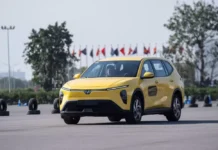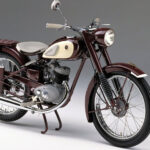A Remarkable Milestone in History
Many people often wonder if there is any connection between Yamaha guitars and the well-known Yamaha motorcycles that grace the streets of Vietnam.

Upon closer inspection, it is revealed that the esteemed Yamaha motorcycle company actually originated as a musical instrument manufacturer. Torakusu Yamaha, the founder of Yamaha Corporation, initially started his career by crafting musical instruments.
After spending six months repairing instruments and gaining familiarity with pianos, Torakusu created his own highly acclaimed instrument that could rival imported ones. In 1888, he established the Nippon Gakki Company, specializing in instrument production.
Following Torakusu Yamaha’s passing in 1916, the company continued to produce pianos and other musical instruments. However, the Kanto earthquake in 1923 and the devastation of World War II pushed Yamaha to the brink of bankruptcy.
The individual attributed with reviving Yamaha was the company’s third president, Kaichi Kawakami. He implemented extensive reforms that helped Yamaha stay afloat until he passed the reins to his son, Genichi Kawakami.

“I want us to try creating a motorcycle engine,” uttered Chairman Genichi Kawakami, catalyzing the genesis of Yamaha Motor. At the age of 38, Genichi Kawakami assumed control of his father’s business at Nippon Gakki (now Yamaha Corporation) and became the fourth president of the company. His first challenge arose when he had to choose between utilizing the existing machinery for either sewing machine production or motorcycle manufacturing.
Thanks to his visionary mindset, Genichi Kawakami opted for motorcycles despite fierce competition from over 150 manufacturers of varying scales in the market. He recognized that Yamaha was entering an arduous race where success would hinge on differentiation and the indispensability of its offerings.
As a result, Genichi Kawakami decided to invest in sending engineers to Europe to glean knowledge from the industry’s pioneers. He also spent over three months conducting thorough surveys in major markets such as the USA and Europe. These practical experiences were then consolidated and applied to Yamaha’s new business model by the company’s leaders and engineers.
The Maiden Yamaha Motorcycle
Yamaha’s initial milestone was marked by the launch of the YA-1 motorcycle in 1955. Boasting an attractive design, a sporty demeanor, and unique hues such as hazel brown and ivory, coupled with Yamaha’s exceptional paint technology borrowed from piano manufacturing, the YA-1 stood out among the market’s otherwise staid and mundane motorcycles.

However, by the time the YA-1 debuted, Yamaha’s reputation was already established among the Japanese populace through their musical instruments. Consequently, the company faced biases and criticisms such as “Yamaha motorcycles will surely produce the melodies of do, re, mi while in motion.” To counter these prejudices, Genichi Kawakami discreetly organized a motorcycle race up Mount Fuji in 1955 to showcase the power of the YA-1. Yamaha’s triumph, with a first-place finish and five other motorcycles in the top 10 of the 125cc category, cemented the company’s reputation throughout Japan.
The YA-1 was developed based on Germany’s DKW RT125 prototype, which was lauded for its elegance and advanced technology at the time. Genichi Kawakami instructed his team of engineers to meticulously study and replicate all the advantageous features of the RT125. He demanded a final product that possessed the original’s excellence while being creatively tailored to suit the Japanese market.
As a result, Yamaha engineered an engine that closely resembled the RT125 while incorporating a 4-speed transmission instead of the original 3-speed variant. The YA-1 featured a 2-stroke, single-cylinder engine with a 125cc displacement and air cooling.
With a power output of 5.6 horsepower at 5,000 rpm and a maximum torque of 9.4 Nm at 3,300 rpm, the YA-1 possessed the capability to conquer any challenging terrain.
The YA-1 encompassed all the elements of a successful motorcycle: exquisite design, a unique brown-red paint color, a smooth kick start, and swift acceleration. As a result, the YA-1 offered effortless usability and bestowed its users with a sophisticated and elegant lifestyle.
Genichi Kawakami’s strategic maneuver transformed the previously inconspicuous YA-1 into a renowned motorcycle across Japan. Sales soared, with approximately 11,000 YA-1 motorcycles being sold annually for three consecutive years, despite their relatively high price. This accomplishment materialized even as Japan’s economy grappled with post-World War II challenges. Furthermore, the advent of the YA-1 heralded the birth of a mighty “motorcycle empire” named Yamaha.
- When did the Yamaha Exciter first make its debut in Vietnam?
- When was the first motorcycle created? (Part 1)
- When was the first motorcycle created? (Part 2)
Khánh An (Trithucthoidai)











































